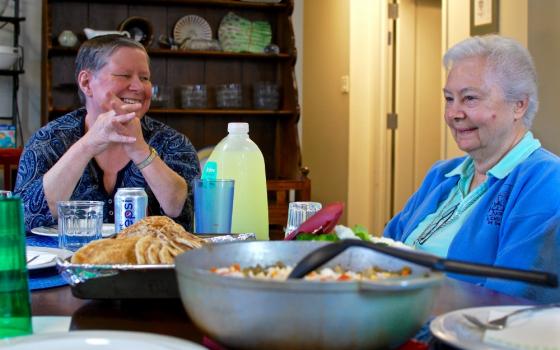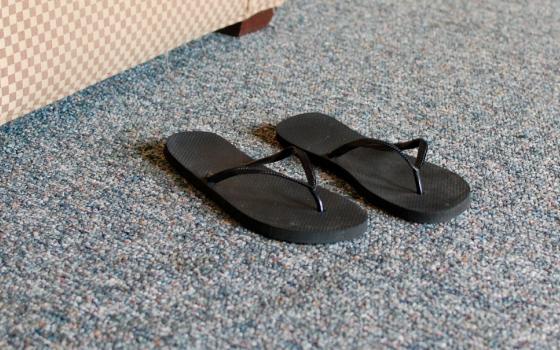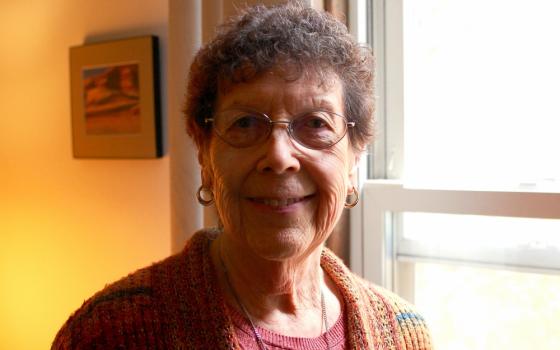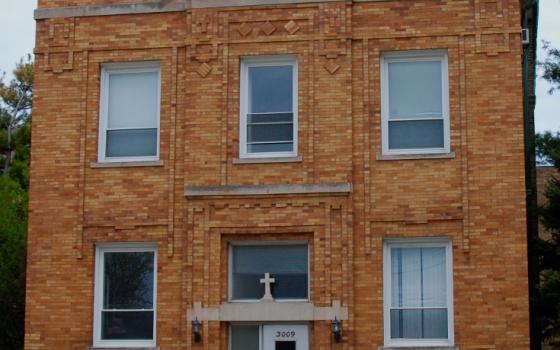The 45-year-old man sits on the edge of the couch – not tense, but not relaxed, either. He wears a button-down shirt and khakis, but also tennis shoes. He’s anxious to move forward, but has nowhere to go.
Marwan is a man in the middle.
Three years ago, he, his wife and their four children fled the civil war in Syria, leaving behind their home, friends, family and Marwan’s banking career. Out of fear, Marwan won’t say where they fled to or where his family is now, but in October, Marwan flew alone to Chicago with a visitor’s visa, and when he arrived, asked for asylum.
So Immigration Control and Enforcement officials put him in jail.
Technically, Marwan was “detained,” but the reality is he was held for five months in the McHenry County Jail in the Chicago suburbs. With no friends or relatives in the United States, when he was released he went to the Marie Joseph House for Men in Cicero, Illinois, a project of the Interfaith Committee for Detained Immigrants.
The House for Men and a House for Families at the Catholic Theological Union in Chicago’s Hyde Park opened May 1, 2014. Each is now home to about a dozen people either waiting for final permission to stay in the United States or who do have permission and are learning how to live here – getting training or going to school, finding jobs and saving money for somewhere to live.
Global Sisters Report spent a day recently with those staying at the houses; only people’s first names are used while their cases work through immigration courts.
Srs. of Mercy JoAnn Persch and Pat Murphy formed the interfaith committee after going to the Immigration Processing Center in nearby Broadview in 2007, where each Friday morning, buses filled with shackled detainees leave for the Chicago airport to be deported.
According to the Transactional Records Access Clearinghouse, a data research group at Syracuse University, immigration judges issued nearly 79,000 removal orders last year. Only 23,000 people were granted relief and allowed to stay.
“We felt a strong call that day to do something about what we were seeing,” said Persch, the committee’s executive director. “Families with men and women ripped from their arms.”
So they began a weekly prayer vigil, which has expanded to praying with families of those in detention, praying with detained immigrants inside the detention center and even praying with deportees on the buses before they depart.
Then came a court watch program, making sure there is a witness every day in the federal Immigration Court. After that, a pastoral care program at the McHenry County Jail, where up to 400 detainees are held – although getting inside required a change in state law, which became effective in December 2008. Even with the new law, the local sheriff was reluctant to let these visitors in. But the program has become so warmly accepted that ICE officials asked Interfaith Committee for Detained Immigrants to expand into visiting detainees held in Kenosha, Wisconsin, about an hour and-a-half north.
After the pastoral care program had been operating a while, Persch said, they started getting calls from attorneys and family members saying someone they had met with was being released and needed help. So the interfaith committee – now made up of people from 16 different faith groups – began taking them to the bus station, buying their bus tickets, and making sure they had appropriate clothing and money for food.
“But more and more often, a lawyer would say, ‘They don’t have family. They have nowhere to go,’” Persch said.
A client they had met with for eight months was released on a rare day that both Persch and Murphy were not working. They were able to make some phone calls to get her into an overnight shelter, but then she disappeared. Her body was found three days later in an abandoned warehouse, Persch said.
“We said this can never happen again,” she said.
That’s when Viatorian Br. Michael Gosch got involved, working to find shelter for those released with nowhere to go. Gosch now oversees the two Houses of Hospitality.
“But the population of detainees continued to grow, and court dates were so far down the road, we knew we needed a building,” Persch said.
Eventually, they thought to use the former convent at Saint Mary of Czestochowa church in Cicero but realized it would be immediately overflowing. The convent became the men’s house. Then the interfaith committee was offered a floor of a former residence hall at CTU, which became the family house. The three-story brick convent has an institutional feel, like a dormitory, while the family house, in a Chicago high-rise where each room has its own bathroom, feels more like an apartment building where everyone eats together.
Now the interfaith committee has grown to 200 volunteers and a budget of nearly $1 million – but both houses are full, and Persch said they could fill several more.
“I say this is the hand of God,” Persch said. “It’s not Pat and I. Pat’s 86 and I’m 80 – who are we to do any of this? But God just keeps sending us the right people.”
That’s how Marwan feels. He’s been three years with no career and no income, and six months with his family oversees waiting for permission to join him. But the Interfaith Committee for Detained Immigrants was there for him as soon as he was locked up.
“You feel somebody is standing with you. They’re trying to give you a big support,” Marwan said. “It’s like family.”
He now has permission to stay in the U.S. and has been told his family may be able to come here in six to eight months, but everything is uncertain. In the meantime, he’s in a hospitality training program.
“It’s timing, timing, timing,” he said. “I’m looking for a normal life.”
Marquito Daudo can relate. He’s been the house coordinator at the men’s house since December, and is an immigrant from Mozambique here on a student visa. He has a wife and daughter back home waiting for him.
“It’s easy for them to talk to me, because I get it,” Daudo said. “I understand. . . . I had those feelings too. Everything was different, the food, the timing of things. But I can tell them, ‘This is what it takes.’”
Daudo said life for the clients is much better than in detention – they have freedom, their own room – but they also have chores around the house and are trying to learn how to survive in a land utterly foreign to them.
“They don’t know how to buy a gallon of milk,” he said. “Yesterday, home was just a small cell. Here they wash their own clothes. They work, they try to cook their own meals.”
The stress sometimes shows, Daudo said – there is an overnight chaplain in the house who stays busy with the men who cannot sleep. Some watch television until they finally drift off.
Clients can stay at the houses as long as they need to, and Daudo said he knows the work he and the others on the interfaith committee are doing is important.
“I get tired, but I believe that what we do here is better than just a paycheck,” he said. “One day, they’ll look back and say, ‘I made it.’”
Mohamed, 37, hopes to make it one day. He fled his native Egypt after being told he would have to return to military service after the Arab Spring. To refuse service meant death.
“I didn’t want to be forced to kill people I’m supposed to protect,” he said.
So he fled, making a new life in countries around the world, including Kuwait, Iraq, Italy, Spain and Mexico. It was Mexico that tripped him up.
He was there legally, but his visa was running out. He could get a new one, but needed to leave the country first and then return to Mexico. When he was detained at a U.S. airport for allegedly misusing his transit visa – he says he was not because he wasn’t staying here – he applied for asylum, because he’ll be killed if he returns to Egypt.
Now he has a work permit and can get a driver’s license, but things are still up in the air.
“Anything can change at any time, and my case might take up to 10 years,” he said. “It’s like asking a bank for a big loan and you don’t know if you can pay it or not.”
Detention and being in legal purgatory have been difficult: He was a logistics engineer, a language teacher and a business administrator, he said.
“I had a life. I had a big life,” Mohamed said. “I speak five languages. The first time to be treated [badly] was here. I’ve not even had a traffic ticket in my life. . . . All this process is hard. It’s really hard. It’s depressing.”
At the family house, Immaculate Heart of Mary Sr. Mary Ann Penner said the staff and volunteers try to remember that even though it’s much better than detention, the living situation for the 17 people currently staying there can be difficult.
“People have run their own households, and then they come here,” Penner said. “It’s like joining religious life.”
Add to that language barriers and cultural issues and even things like dealing with Chicago’s harsh winter weather.
For Congregation of Notre Dame Sr. Marilynn Medinger, who lives in the family house and is the kitchen manager, it’s what the clients have been through in detention that moves her. She used to be part of the pastoral care program for McHenry County Jail and is now part of the Kenosha program.
“The thing that’s hard for me to fathom is none of them can go outside [when in detention]. One woman said, ‘I miss the flowers.’ That did it for me – I was a basket case,” Medinger said. “That, I think, is cruel and unusual – we don’t do that to our worst criminals, and these are people with a minor violation. . . . It boggles my mind that we do this.”
But as she talks, there is the sound of happy children laughing in the hallway running toward the kitchen, where some of the clients have spent most of the day hand-making tortillas.
At dinner, there are homemade gorditas made with the fresh tortillas, rice and a flavorful – but fiery – hot sauce, and there is laughter as clients and the sisters pass bowls of food, pour tea and lemonade.
There is gentle teasing over who has to do chores, there is lavish attention paid to the children. The fears and worries about documents and court dates are forgotten as everyone laughs at Fernando for using too much hot sauce.
And for a few minutes, this little oasis in the middle of a vast and sometimes unforgiving land almost feels like home.
[Dan Stockman is national correspondent for Global Sisters Report. Follow him on Twitter @DanStockman or on Facebook.]






